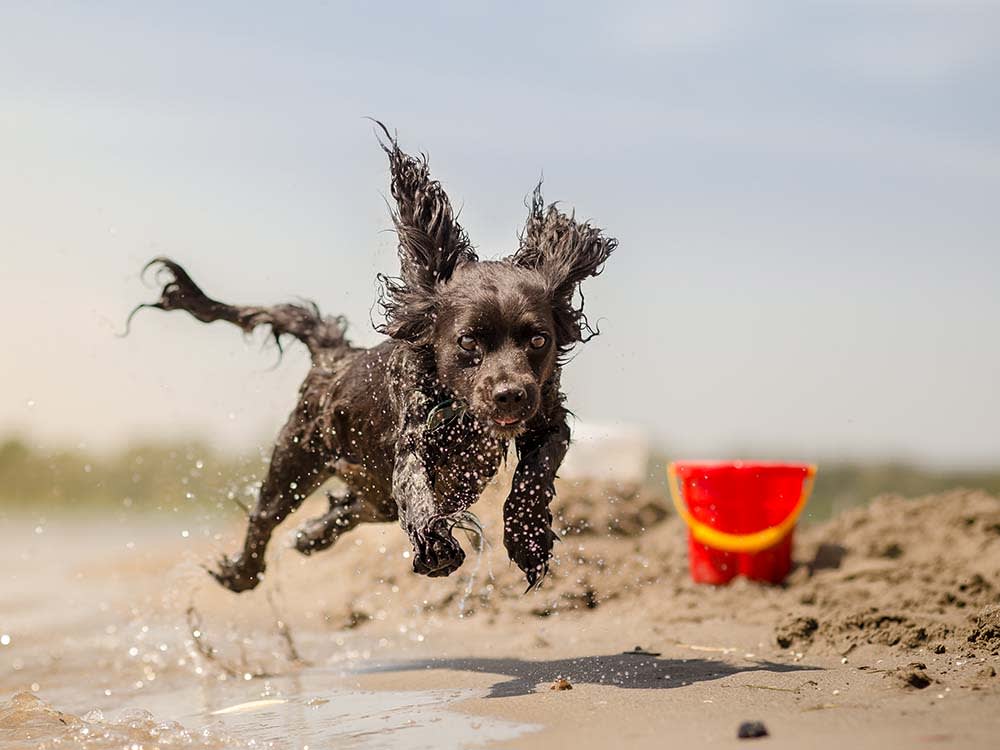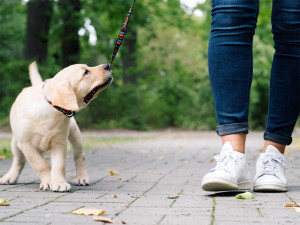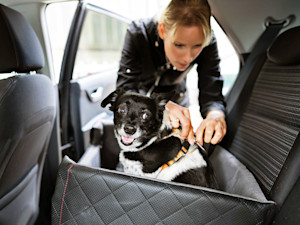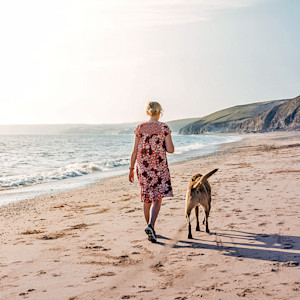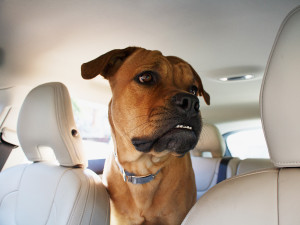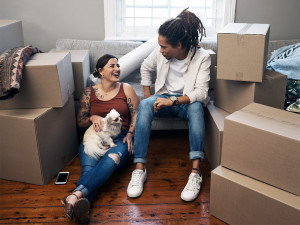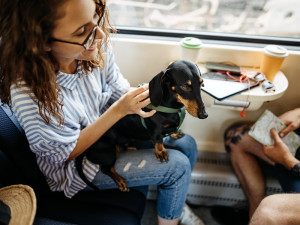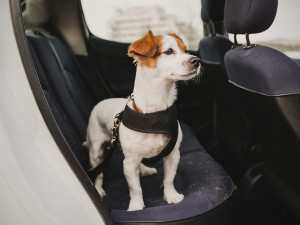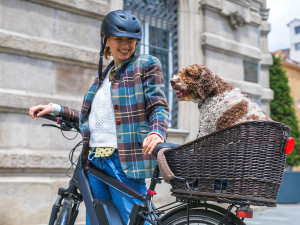Can I Take My Anxious Dog On Holiday?
Think a holiday with your nervous pup is off-limits? You just need to make a few adjustments. Here’s how to have a dreamy trip that you and your anxious dog can enjoy
Travelling with dogs is a real joy – watching them explore and have fun in new places and environments, and then settle down at the end of a busy day to snooze by the fire or at the foot of your hotel bed. It’s one of the most rewarding things we can do with our pets.
I’ve been travelling with my dog for several years thanks to my job – I’m a travel writer and author of the books Dog Days Outopens in new tab and Dog-Friendly Weekendsopens in new tab – but it’s not been easy, and not for the reasons you might think. Aside from the challenge of finding places that are dog friendly, my work is made trickier by the fact that I have an anxious dog.
Arty, my Manchester Terrier, was a lockdown pup whose experience of the world was much quieter and calmer than the post-pandemic reality. This led to him experiencing some anxieties around specific triggers: he’s wary of strangers, easily spooked by rambunctious children, and often fearful of dogs that get too close for comfort. He is what I’d consider to be a reactive dog, but with training and support from behaviourists and vets, we’ve conquered many of his fears and found a way to travel together that makes it enjoyable for everyone – including me.
The world around us needn’t be closed off to those with anxious or reactive dogs, but we owners of such sensitive animals just need to know how best to do it. If you’ve got an anxious dog, here’s what you need to know about taking them on holiday.
Can you take an anxious dog on holiday?
The answer to this is, of course, yes. The world is your oyster, within the confines of its dog friendliness. But the real question is should you travel with your anxious dog? Animal behaviourist and owner of Hertfordshire-based Dog-ease Training Schoolopens in new tab, Adem Fehmiopens in new tab, says there’s no straightforward answer here.
“An owner should carefully consider if their dog would find staying at home with a family member or trusted sitter a better experience than being taken on holiday,” he says. “Especially if the dog in question finds change, travelling, busy places, new environments, other dogs and even external stimuli that cannot be controlled, anxiety inducing.”
Of course, some dogs’ anxiety relates to separation from their pet parents. In this case, taking your dog on holiday might actually be the better solution, says Adem. “A pet parent would need to tailor their trip with their dog in mind in order to keep anxiety at bay.”
That could mean avoiding travel during school holidays if children are your dog’s trigger, or avoiding busy places where dogs are likely to be off-lead if your pet is fearful of fellow dogs (such as popular beaches or well-trodden trails in national parks).
“Train for the holiday you have planned for,” says Adem. “This might mean undertaking training so your dog feels confident travelling by car, or even train or boat. Practise little and often, making experiences positive and building on this before any longer trips are taken to give your dog the best chance of feeling confident.
“Similarly, you might need to build up your dog’s social experiences and teach them to settle when out and about if this is not something they are currently used to but you will be visiting dog-friendly venues when on holiday.”
Ultimately, it’s about knowing your dog, understanding their fears and being able to mitigate the impact of any triggers, and that’s always best done with the help of a professional trainer or behaviourist.
What’s the best way to travel with an anxious dog?
The way you choose to travel can make or break your anxious dog’s holiday. If they’re anxious from the start, this can have a domino effect on any other triggers they might come across and will make it much harder for you to manage – and nobody wants that when you’re supposed to be on a relaxing holiday.
I always try to travel by car with Arty – it gives us the freedom and flexibility we need, and he’s never anxious travelling in his crash-tested crate in the boot. We never drive for more than five hours in a day and have regular stops for wee breaks and leg stretching. I always try to plan a lovely walk stop halfway through the drive to break it up and give him some sniffing time somewhere interesting – this helps stimulate his brain while keeping him calm in the car afterwards.
If you have to travel by train or bus, ensure your dog has been socialised on such transport – early exposure in short bursts with positive reinforcement can prepare them for longer journeys on public transport. You might want to consider bringing along a settle mat (I use one from the Chic Pup Coopens in new tab) so they have their own space to feel safe on, and long-lasting chews or a frozen Kong to keep them occupied during the journey.
What accommodation is best for anxious dogs?
Dog-friendly accommodation abounds in the UK: there are hotels, glamping sites and all manner of unique and charming self-catering options. But not all dogs will love being in hotels, and not every pet parents will want to cook for themselves. Anxious dogs or reactive dogs might do better in more remote, self-catering places where they can feel safe, calm and remain unbothered by their main triggers. Holiday providers like Paws & Stay have a collection of properties with enclosed gardensopens in new tab, while Norfolk-based self-catering company East Ruston Cottages categorises their properties based on whether they’re suitableopens in new tab for sight- and sound-reactive dogs.
But while self-catering might work better for many, hotels are also doing their best to welcome anxious dogs, too. Holiday booking company PetsPyjamasopens in new tab recently launched an initiative called Woof Well-being Retreatsopens in new tab to do just that: “Heading on holidays is a lovely and enjoyable experience for owners, and we want it to be the same for our canine companions,” says co-founder Karen Hanton.
How can you have days out with anxious dogs?
As Adem Fehmi suggests, tailoring your trip to your dog’s needs and anxieties is the best way to have a relaxing break. This means actively avoiding places where you might find your dog is triggered. Travelling out of season is always the best way for those with dogs anxious around large groups of people or kids, and choosing your days out wisely will help. If you want to avoid off-lead dogs, try walking in places where there are rules around keeping dogs on lead, such as National Trust properties or English Heritage attractions – we love Calke Abbey in Derbyshire for an on-lead adventure.
If it’s beaches you’re after, eschew the immensely popular ones for something a little quieter: the Norfolk coast has plenty of beaches that don’t get the mass tourism we see in Cornwall and Devon, and there’s miles of coastline in Northumberland where dogs will have plenty of space. If you’re going to the southwest, try somewhere like Saunton Sands, which is four miles long, offering plenty of space for your dog to avoid the things that make them anxious.
What should you pack for travelling with anxious dogs?
Beyond the obvious – bed, bowl, towels, treats and food – there are a few top products I rely on to keep my dog happy on our holidays.
A travel matopens in new tab
This offers your dog a familiar and comfy place to settle when on transport, a pub or at the hotel’s breakfast buffet.
Long-lasting chewsopens in new tab or Kongsopens in new tab
Anxious dogs need an outlet for their stress, so bringing along things they can chew or lick will mean they have just that. These can also be handy for keeping them entertained during pub lunches, too.
A waterproof longlineopens in new tab
For dogs that might get easily spooked and run off, a longline can give them a little more freedom while you enjoy some peace of mind. These are perfect for busy beaches or walks in woodlands and other natural places where your dog might be easily lost.
A Pawfit GPS Trackeopens in new tabropens in new tab
If you really want to keep tabs on your dog and ensure they don’t get lost while roaming free, attaching a Pawfit Tracker can help keep your worries at bay.
A MIMsafe car crateopens in new tab
For dogs with anxiety around the car, this crate is an excellent investment. It’s silent when travelling, ensuring the dog doesn’t become stressed by the rattling of a normal dog cage, and it’s crash-tested meaning if you are in an accident, your dog will remain unharmed and protected by the crate.
